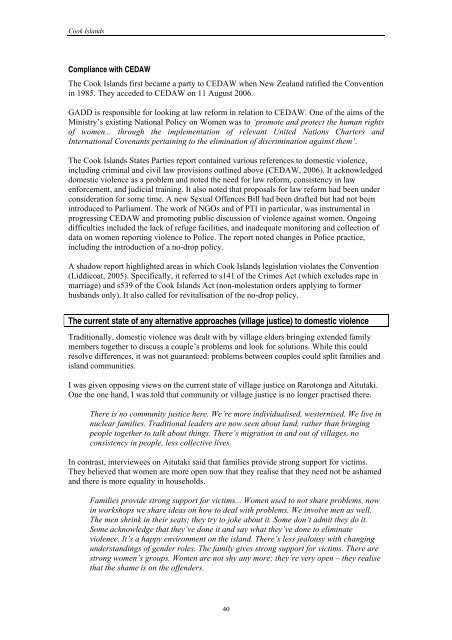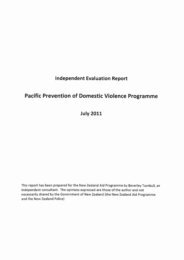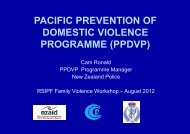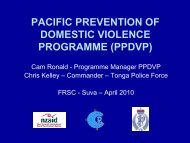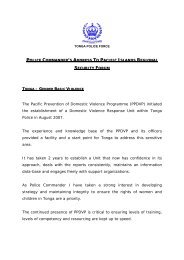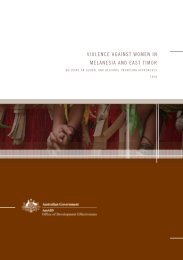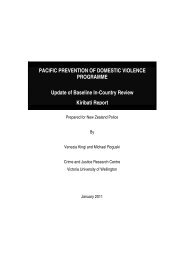Cook Islands - Pacific Prevention of Domestic Violence Programme
Cook Islands - Pacific Prevention of Domestic Violence Programme
Cook Islands - Pacific Prevention of Domestic Violence Programme
You also want an ePaper? Increase the reach of your titles
YUMPU automatically turns print PDFs into web optimized ePapers that Google loves.
<strong>Cook</strong> <strong>Islands</strong><br />
Compliance with CEDAW<br />
The <strong>Cook</strong> <strong>Islands</strong> first became a party to CEDAW when New Zealand ratified the Convention<br />
in 1985. They acceded to CEDAW on 11 August 2006.<br />
GADD is responsible for looking at law reform in relation to CEDAW. One <strong>of</strong> the aims <strong>of</strong> the<br />
Ministry’s existing National Policy on Women was to ‘promote and protect the human rights<br />
<strong>of</strong> women... through the implementation <strong>of</strong> relevant United Nations Charters and<br />
International Covenants pertaining to the elimination <strong>of</strong> discrimination against them’.<br />
The <strong>Cook</strong> <strong>Islands</strong> States Parties report contained various references to domestic violence,<br />
including criminal and civil law provisions outlined above (CEDAW, 2006). It acknowledged<br />
domestic violence as a problem and noted the need for law reform, consistency in law<br />
enforcement, and judicial training. It also noted that proposals for law reform had been under<br />
consideration for some time. A new Sexual Offences Bill had been drafted but had not been<br />
introduced to Parliament. The work <strong>of</strong> NGOs and <strong>of</strong> PTI in particular, was instrumental in<br />
progressing CEDAW and promoting public discussion <strong>of</strong> violence against women. Ongoing<br />
difficulties included the lack <strong>of</strong> refuge facilities, and inadequate monitoring and collection <strong>of</strong><br />
data on women reporting violence to Police. The report noted changes in Police practice,<br />
including the introduction <strong>of</strong> a no-drop policy.<br />
A shadow report highlighted areas in which <strong>Cook</strong> <strong>Islands</strong> legislation violates the Convention<br />
(Liddicoat, 2005). Specifically, it referred to s141 <strong>of</strong> the Crimes Act (which excludes rape in<br />
marriage) and s539 <strong>of</strong> the <strong>Cook</strong> <strong>Islands</strong> Act (non-molestation orders applying to former<br />
husbands only). It also called for revitalisation <strong>of</strong> the no-drop policy.<br />
The current state <strong>of</strong> any alternative approaches (village justice) to domestic violence<br />
Traditionally, domestic violence was dealt with by village elders bringing extended family<br />
members together to discuss a couple’s problems and look for solutions. While this could<br />
resolve differences, it was not guaranteed: problems between couples could split families and<br />
island communities.<br />
I was given opposing views on the current state <strong>of</strong> village justice on Rarotonga and Aitutaki.<br />
One the one hand, I was told that community or village justice is no longer practised there.<br />
There is no community justice here. We’re more individualised, westernised. We live in<br />
nuclear families. Traditional leaders are now seen about land, rather than bringing<br />
people together to talk about things. There’s migration in and out <strong>of</strong> villages, no<br />
consistency in people, less collective lives.<br />
In contrast, interviewees on Aitutaki said that families provide strong support for victims.<br />
They believed that women are more open now that they realise that they need not be ashamed<br />
and there is more equality in households.<br />
Families provide strong support for victims... Women used to not share problems, now<br />
in workshops we share ideas on how to deal with problems. We involve men as well.<br />
The men shrink in their seats; they try to joke about it. Some don’t admit they do it.<br />
Some acknowledge that they’ve done it and say what they’ve done to eliminate<br />
violence. It’s a happy environment on the island. There’s less jealousy with changing<br />
understandings <strong>of</strong> gender roles. The family gives strong support for victims. There are<br />
strong women’s groups. Women are not shy any more; they’re very open – they realise<br />
that the shame is on the <strong>of</strong>fenders.<br />
40


